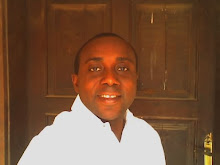Monday, April 22, 2013
Dinning at the table of Shekau
For there to be a well ordered and properly structured society, every human activity must operate from the premises of certain accepted beliefs, which include ethics, etiquettes and values. Indeed, no matter the relative unimportance of so personal a task, it still requires to be done on its accepted normal procedure. Take an ordinary task, like having a dinner amongst a group of close family friends and relations, which should neither require a special training, nor an expertise of specializing in filling one’s own stomach.
Yet, even an automatic and necessary human activity such as this, requires its partaker to observe certain norms, like the basic instinct and simple etiquette of imbibing formal table manners, which are knowing where to sit, how to sit, what to wear, proper handling of the cutlery, how to eat, acceptable topics of discourse during dinner and even the required quantity to be served, to avoid creating the tag of heavy and predatory consumer. Any deviation from the established norm and a quiet albeit enjoyable evening activity is turned into an unmitigated and ill-digesting disaster.
In a similar context, appointment into a public office or a representative committee also has its own fundamental ethos, which include; seeking for competent and qualified persons, vetting of the individual chosen to determine suitability and prior contact with the personalities appointed as a ground to explore whether he, she or even them are interested in the job offered. This is regarded as the basic minimum requirement of employment in any responsible corporate organization, much less an accountable government body of great importance.
Thus, you could understand the shock of many a citizen of this great yet threatened country, when news filtered from Abuja, on the announcement of a number of individuals in a regional security committee, widely called as the Boko Haram Amnesty Committee. What flabbergasted, annoyed and confused a lot of Nigerians, was not merely a government pronouncement on a highly divisive matter, which has yet to achieve a consensus of majority of the countries citizens, but, rather a proclamation that took almost everyone including the appointees unawares.
Before the pronouncement of the unveiling of the committee, it has been a confusion galore, as much speculation has been going on in the media, on the existence of an exploratory security committee, composed of mainly top national security and military officials, having as its main term of reference, the desire to determine the necessity or otherwise of granting amnesty to the insurgents of Jama’atu Ahlil Sunna Lil Da’awati Wal Jihad.
The widely accepted and speculated acclaim on the committee is the inference that it is being headed by the Sultan of Sokoto, Alhaji Muhammad Sa’ad Abubakar, though he later forcefully rejected any association with the committee, confirming the general wisdom that the panel was never a formal committee, since its inauguration was never broadcasted in the media, but, that it was merely a presidential exploratory group composed of Lieutenant General Azubuike Ihejirika, the Nigerian Chief of Army Staff and his boys, who have always believed in the military option as the best solution, despite its evident failure to quell the simmering civil conflict of terroristic proportion.
It is upon such a maze of confusion, the committee on amnesty came into existence, which was established to grant pardon to individuals who have never shown remorse for their action, accepted responsibility for committing a wrongful act or exhibited a form of repentance on any action ever taken. Indeed, it is even questionable whether an exploratory group composed of notoriously known hawks in the administration, could have been the persons who recommended granting amnesty to the insurgents to the Nigerian president, after all, none of the major players in the conflict had acknowledged meeting any membership of the highly secretive committee, nor was a published report of its findings formally submitted to the presidency.
In fact, the announcement of amnesty committee looked seemingly like a kneejerk response, to a journalist’s forced disowning of membership of the panel by the Sultan of Sokoto, which as an information, had it being allowed to linger for a long time in the media without a response, it would have caused a great sense of embarrassment to the government. Because, it would have merely confirmed the widely held suspicion that the administration never believed in the proposed amnesty program.
What happened after the unveiling of the committee, even before its much anticipated inauguration, highlighted the evident futility in the lack of following of due process and fundamental ethos of officially congregating a committee membership, as two of the twenty six members immediately declined interest in being part of the group, while majority of the others openly complained of lack of proper protocol, in announcing their names in such a highly sensitive assignment, without first informing them of the task ahead and the committees greater mandate, procedurally known as the general terms of reference.
Of course, many citizens of this country including some of the committee membership, have acknowledged the fact that the stage of granting amnesty has not arrived, since not even an exploratory talks have started, as a prelude to general reconciliation exercise that could encapsulate an acceptance of responsibility, seeking for a pardon, granting of amnesty and proposing of an adequate recompense to the party goaded to drop arms and sheath its destructive activity. Thus, pending the attainment of these well established conflict resolution stages, Nigerians could be left with the impression that an involvement in the proposed committee membership, was only a vain effort at partaking in a sumptuous federal dinner at the expense of a highly indoctrinated group, who would hardly take it lightly.
Subscribe to:
Post Comments (Atom)

No comments:
Post a Comment